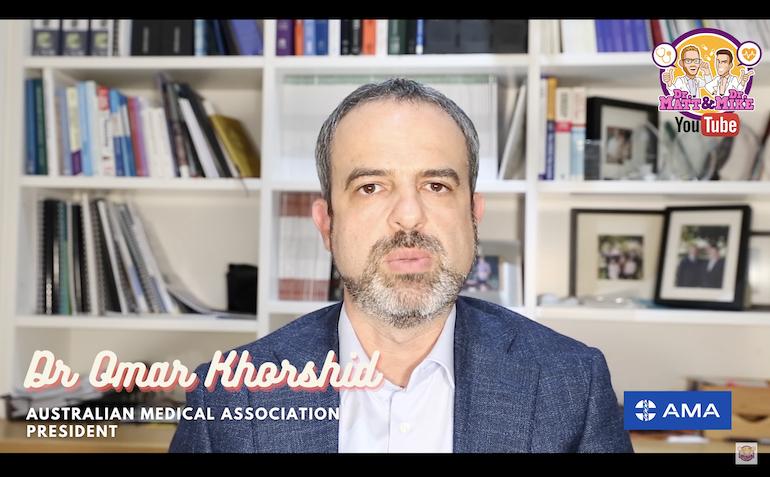Reaching beyond mainstream media to address COVID-19 misinformation
Dr Omar Khorshid features in YouTube series explaining COVID facts to young people.

Dr Omar Khorshid features in YouTube series explaining COVID facts to young people.
AMA President Dr Omar Khorshid is the featured expert in a series of YouTube videos launched this week as part of a partnership between YouTube and prominent Australian YouTube health communicators Dr Matt Barton and Dr Mike Todorovic ("Dr Matt & Dr Mike"). The series is part of a global effort by YouTube to better communicate facts about COVID vaccinations to a younger audience.
Dr Matt & Dr Mike are popular content creators who have more than 218,000 subscribers on their YouTube channel. Their videos have had over nine million views. Researchers and lecturers at Griffith University, Dr Matt & Dr Mike began publishing videos on a range of health and science topics, breaking down complex scientific content for their audience in an informative and engaging way. Their video “COVID-19 and Loss of Smell Explained” alone has well over half a million views.
YouTube approached the AMA earlier this year seeking a partnership to provide authoritative information to a younger audience in an effort to combat misinformation on COVID vaccines. The series answers questions which were sourced from YouTube/Google's global analytics, revealing the most asked questions on COVID vaccinations by Google users, as well as questions posed to Dr Matt & Dr Mike on their social media platforms.
The first of Dr Khorshid's videos with Dr Matt & Dr Mike launched on 23 September on the topic of COVID-19 Vaccines: Fertility and Pregnancy.
Elsewhere in the media, Dr Khorshid wrote about the struggles facing young people amidst COVID and called for a long-term fix of the nation’s mental health system to help.
In an opinion piece written for The Guardian last Friday, Dr Omar Khorshid said Australia was in danger of having young people needing clinical help for their mental health fall through the cracks.
He said, while the 2020-21 budget of $2.3bn for mental health and suicide prevention had been welcome, the significant investment in new digital mental health assessment and referral platforms, ignored well-established, evidence-based clinical mental care.
“A digital platform can never replace face-to-face attention from clinical experts and it will be the tech-savvy young people – the very people we need to catch who may be anxious or unwell – who are inclined to use these platforms, but who are in danger of falling through the cracks if used independently of clinical oversight from a GP,” Dr Khorshid wrote in the opinion piece.



